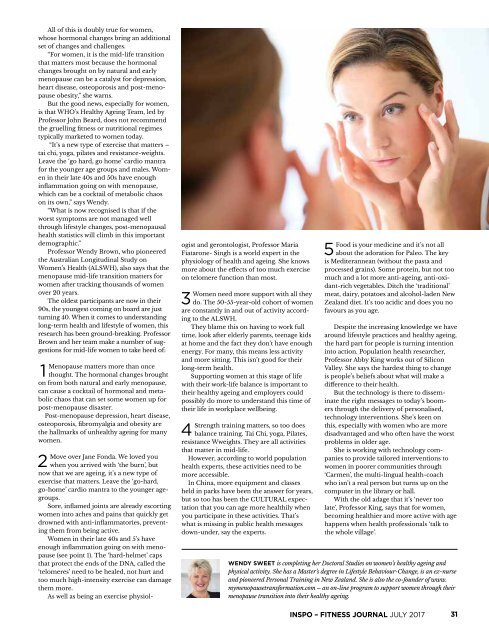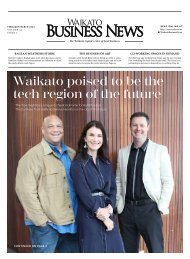INSPO Fitness Journal July 2017
Everything from nutrition, beauty, home and workplace wellbeing to health, performance – and so much more.
Everything from nutrition, beauty, home and workplace wellbeing to health, performance – and so much more.
You also want an ePaper? Increase the reach of your titles
YUMPU automatically turns print PDFs into web optimized ePapers that Google loves.
All of this is doubly true for women,<br />
whose hormonal changes bring an additional<br />
set of changes and challenges.<br />
“For women, it is the mid-life transition<br />
that matters most because the hormonal<br />
changes brought on by natural and early<br />
menopause can be a catalyst for depression,<br />
heart disease, osteoporosis and post-menopause<br />
obesity,” she warns.<br />
But the good news, especially for women,<br />
is that WHO’s Healthy Ageing Team, led by<br />
Professor John Beard, does not recommend<br />
the gruelling fitness or nutritional regimes<br />
typically marketed to women today.<br />
“It’s a new type of exercise that matters –<br />
tai chi, yoga, pilates and resistance-weights.<br />
Leave the ‘go hard, go home’ cardio mantra<br />
for the younger age groups and males. Women<br />
in their late 40s and 50s have enough<br />
inflammation going on with menopause,<br />
which can be a cocktail of metabolic chaos<br />
on its own,” says Wendy.<br />
“What is now recognised is that if the<br />
worst symptoms are not managed well<br />
through lifestyle changes, post-menopausal<br />
health statistics will climb in this important<br />
demographic.”<br />
Professor Wendy Brown, who pioneered<br />
the Australian Longitudinal Study on<br />
Women’s Health (ALSWH), also says that the<br />
menopause mid-life transition matters for<br />
women after tracking thousands of women<br />
over 20 years.<br />
The oldest participants are now in their<br />
90s, the youngest coming on board are just<br />
turning 40. When it comes to understanding<br />
long-term health and lifestyle of women, this<br />
research has been ground-breaking. Professor<br />
Brown and her team make a number of suggestions<br />
for mid-life women to take heed of:<br />
1<br />
Menopause matters more than once<br />
thought. The hormonal changes brought<br />
on from both natural and early menopause,<br />
can cause a cocktail of hormonal and metabolic<br />
chaos that can set some women up for<br />
post-menopause disaster.<br />
Post-menopause depression, heart disease,<br />
osteoporosis, fibromyalgia and obesity are<br />
the hallmarks of unhealthy ageing for many<br />
women.<br />
2<br />
Move over Jane Fonda. We loved you<br />
when you arrived with ‘the burn’, but<br />
now that we are ageing, it’s a new type of<br />
exercise that matters. Leave the ‘go-hard,<br />
go-home’ cardio mantra to the younger agegroups.<br />
Sore, inflamed joints are already escorting<br />
women into aches and pains that quickly get<br />
drowned with anti-inflammatories, preventing<br />
them from being active.<br />
Women in their late 40s and 5’s have<br />
enough inflammation going on with menopause<br />
(see point 1). The ‘hard-helmet’ caps<br />
that protect the ends of the DNA, called the<br />
‘telomeres’ need to be healed, not hurt and<br />
too much high-intensity exercise can damage<br />
them more.<br />
As well as being an exercise physiologist<br />
and gerontologist, Professor Maria<br />
Fiatarone- Singh is a world expert in the<br />
physiology of health and ageing. She knows<br />
more about the effects of too much exercise<br />
on telomere function than most.<br />
Women need more support with all they<br />
3 do. The 50-55-year-old cohort of women<br />
are constantly in and out of activity according<br />
to the ALSWH.<br />
They blame this on having to work full<br />
time, look after elderly parents, teenage kids<br />
at home and the fact they don’t have enough<br />
energy. For many, this means less activity<br />
and more sitting. This isn’t good for their<br />
long-term health.<br />
Supporting women at this stage of life<br />
with their work-life balance is important to<br />
their healthy ageing and employers could<br />
possibly do more to understand this time of<br />
their life in workplace wellbeing.<br />
4<br />
Strength training matters, so too does<br />
balance training. Tai Chi, yoga, Pilates,<br />
resistance Wweights. They are all activities<br />
that matter in mid-life.<br />
However, according to world population<br />
health experts, these activities need to be<br />
more accessible.<br />
In China, more equipment and classes<br />
held in parks have been the answer for years,<br />
but so too has been the CULTURAL expectation<br />
that you can age more healthily when<br />
you participate in these activities. That’s<br />
what is missing in public health messages<br />
down-under, say the experts.<br />
Food is your medicine and it’s not all<br />
5 about the adoration for Paleo. The key<br />
is Mediterannean (without the pasta and<br />
processed grains). Some protein, but not too<br />
much and a lot more anti-ageing, anti-oxidant-rich<br />
vegetables. Ditch the ‘traditional’<br />
meat, dairy, potatoes and alcohol-laden New<br />
Zealand diet. It’s too acidic and does you no<br />
favours as you age.<br />
Despite the increasing knowledge we have<br />
around lifestyle practices and healthy ageing,<br />
the hard part for people is turning intention<br />
into action. Population health researcher,<br />
Professor Abby King works out of Silicon<br />
Valley. She says the hardest thing to change<br />
is people’s beliefs about what will make a<br />
difference to their health.<br />
But the technology is there to disseminate<br />
the right messages to today’s boomers<br />
through the delivery of personalised,<br />
technology interventions. She’s keen on<br />
this, especially with women who are more<br />
disadvantaged and who often have the worst<br />
problems in older age.<br />
She is working with technology companies<br />
to provide tailored interventions to<br />
women in poorer communities through<br />
‘Carmen’, the multi-lingual health-coach<br />
who isn’t a real person but turns up on the<br />
computer in the library or hall.<br />
With the old adage that it’s ‘never too<br />
late’, Professor King, says that for women,<br />
becoming healthier and more active with age<br />
happens when health professionals ‘talk to<br />
the whole village’.<br />
WENDY SWEET is completing her Doctoral Studies on women’s healthy ageing and<br />
physical activity. She has a Master’s degree in Lifestyle Behaviour-Change, is an ex-nurse<br />
and pioneered Personal Training in New Zealand. She is also the co-founder of www.<br />
mymenopausetransformation.com – an on-line program to support women through their<br />
menopause transition into their healthy ageing.<br />
<strong>INSPO</strong> – FITNESS JOURNAL JULY <strong>2017</strong><br />
31


















